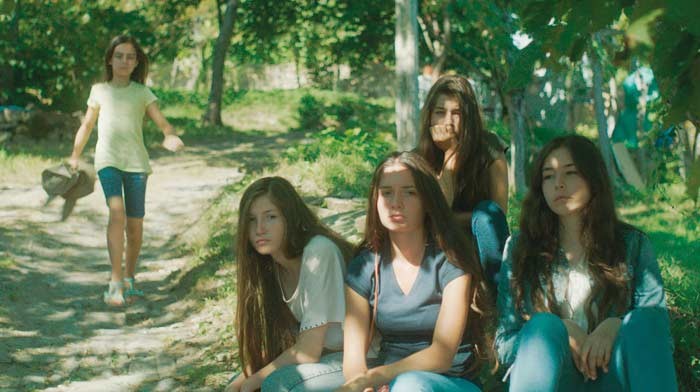VOD film review: Mustang
Review Overview
Perfect performances
9Provocative themes
8.5Powerful direction
8Matthew Turner | On 13, May 2016
Director: Deniz Gamze Erguven
Cast: Gunes Nezihe Sensoy, Doga Zeynep Doguslu, Tugba Sunguroglu, Elit Iscan, Ilayda Akdogan
Certificate: 15
Deservedly nominated for the Best Foreign Film Oscar, this engaging and evocative coming-of-age drama marks the directorial debut of Deniz Gamze Erguven, who co-wrote the script with Alice Winocour (co-writer-director of Matthias Schoenaerts thriller Disorder). Set in Erguven’s native Turkey (she was largely raised in France), the film presents a powerful portrait of youthful rebellion against a repressive society that seems positively terrified of female sexuality.
The film centres on five orphan sisters, Lale, Nur, Ece, Selma and Sonay (played by Güneş Nezihe Şensoy, Doğa Zeynep Doğuşlu, Elit İşcan, Tuğba Sunguroğlu and İlayda Akdoğan), who have come to live with their grandmother (Nihal Koldaş) and uncle Erol (Ayberk Pekcan) in a small Turkish village, following the sudden death of their parents. When a nosy neighbour spots the girls (aged between pre-pubescence and late adolescence) interacting with male schoolmates on a beach, the village is scandalised and the mortified grandmother imprisons the girls in the house while she sets about arranging marriages for each of them in turn.
Erguven lays out the sisters’ situation as a series of escalating indignities – bars are placed on windows, their computers and phones are taken away, they’re forced to wear drab, shapeless clothing and are taught wifely duties such as cooking and cleaning by well-meaning neighbours. Later, when the marriages are arranged, doctors arrive to check that the girls are still virgins and woe betide any of them that doesn’t leave a tell-tale bloodstain on the sheets on their wedding night.
This oppressive sense of injustice and enforced conformity makes the girls’ various acts of rebellion all the more uplifting, as they score small victories, such as sneaking away to watch a female-spectators-only football match in the nearby town, or larger ones, such as securing their choice of male partner against the wishes of the elders. Erguven is also careful to include crowd-pleasing moments of warm humour, such as an aunt taking desperate measures to ensure that the men don’t spot the girls at the football match on TV.
Erguven’s sensitive direction is assured throughout and she coaxes likeable, naturalistic performances from her cast, most of whom are first-timers (only İşcan has previous acting experience). In addition, their sense of united camaraderie is heightened by the way cinematographers David Chizallet and Ersin Gok frequently shoot them all jumbled up together as a tangle of limbs and long, flowing hair.
It’s fair to say that the script isn’t exactly even-handed when it comes to metaphor, but it achieves the desired impact, addressing some provocative and resonant themes. Similarly, the use of voiceover backfires slightly, in that it assures the audience of the future safety of the narrator, but it also lends the film a literary feel that seems appropriate (it’s hard not to be reminded of Jane Austen’s Pride and Prejudice, that other classic story of five sisters who need to be married off).
On top of that, the film is beautifully shot throughout, with Erguven making strong use of authentic, sun-drenched locations, and there’s a terrific score by frequent Nick Cave collaborator Warren Ellis. This is a powerful and beautifully made coming-of-ager that is by turns uplifting, upsetting, rage-inducing and laugh-out-loud funny. Highly recommended.




















